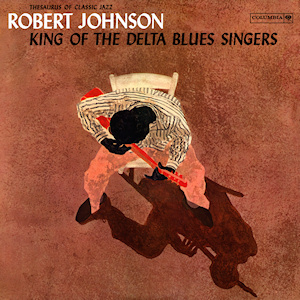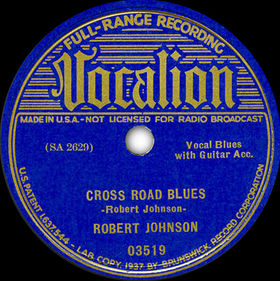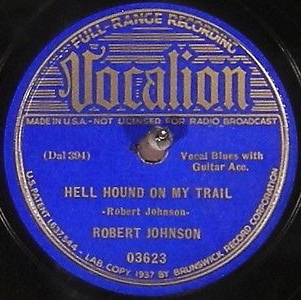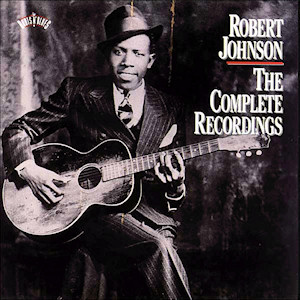
Robert Leroy Johnson was an American blues musician and songwriter. His landmark recordings in 1936 and 1937 display a combination of singing, guitar skills, and songwriting talent that has influenced later generations of musicians. Although his recording career spanned only seven months, he is recognized as a master of the blues, particularly the Delta blues style, and as one of the most influential musicians of the 20th century. The Rock and Roll Hall of Fame describes him as perhaps "the first ever rock star".

Nehemiah Curtis "Skip" James was an American Delta blues singer, guitarist, pianist and songwriter. AllMusic stated: "Coupling an oddball guitar tuning set against eerie, falsetto vocals, James' early recordings could make the hair stand up on the back of your neck."

David "Honeyboy" Edwards was an American delta blues guitarist and singer from Mississippi.

Willie Lee Brown was an American blues guitar player and vocalist. He performed and recorded with other blues musicians, including Son House and Charlie Patton, and influenced Robert Johnson and Muddy Waters. Brown is considered one of the pioneering musicians of the Delta blues genre.

"Love in Vain" is a blues song written by American musician Robert Johnson. Johnson's performance – vocal accompanied by his finger-style acoustic guitar playing – has been described as "devastatingly bleak". He recorded the song in 1937 during his last recording session and in 1939 it was issued as the last of his original 78 rpm records.

Fat Possum Records is an American independent record label based in Water Valley and Oxford, Mississippi. At first Fat Possum focused almost entirely on recording previously unknown Mississippi blues artists. Recently, Fat Possum has signed younger rock acts to its roster. The label has been featured in The New York Times, New Yorker, The Observer, a Sundance Channel production, features on NPR, and a 2004 documentary, You See Me Laughin. Fat Possum also distributes the Hi Records catalog.

King of the Delta Blues Singers is a compilation album by American Delta blues musician Robert Johnson, released in 1961 by Columbia Records. It is considered one of the most influential blues releases. In 2020, Rolling Stone ranked it number 374 on its list of the 500 Greatest Albums of All Time.

"Cross Road Blues" is a song written by the American blues artist Robert Johnson. He performed it solo with his vocal and acoustic slide guitar in the Delta blues style. The song has become part of the Robert Johnson mythology as referring to the place where he sold his soul to the Devil in exchange for musical genius. This is based largely on folklore of the American South that identifies a crossroads as the site where Faustian bargains can be made, as the lyrics do not contain any references to Satan.

"Sweet Home Chicago" is a blues standard first recorded by Robert Johnson in 1936. Although he is often credited as the songwriter, several songs have been identified as precedents. The song has become a popular anthem for the city of Chicago despite ambiguity in Johnson's original lyrics. Numerous artists have interpreted the song in a variety of styles.

"Rollin' and Tumblin'" is a blues standard first recorded by American singer-guitarist Hambone Willie Newbern in 1929. Called a "great Delta blues classic", it has been interpreted by hundreds of Delta and Chicago blues artists, including well-known recordings by Muddy Waters. Rock musicians usually follow Waters' versions, with the 1960s group Cream's rendition being perhaps the best known.

"Dust My Broom" is a blues song originally recorded as "I Believe I'll Dust My Broom" by American blues artist Robert Johnson in 1936. It is a solo performance in the Delta blues-style with Johnson's vocal accompanied by his acoustic guitar. As with many of his songs, it is based on earlier blues songs, the earliest of which has been identified as "I Believe I'll Make a Change", recorded by the Sparks brothers as "Pinetop and Lindberg" in 1932. Johnson's guitar work features an early use of a boogie rhythm pattern, which is seen as a major innovation, as well as a repeating triplets figure.

"Hellhound on My Trail" is a blues song recorded by Mississippi Delta bluesman Robert Johnson in June 1937 and released as a 78 rpm single on Vocalion Records that September. It was inspired by earlier blues songs and blues historian Ted Gioia describes it as one of Johnson's "best known and most admired performances—many would say it is his greatest".

The Complete Recordings is a compilation album by American Delta blues musician Robert Johnson. The 41 songs were recorded in two sessions in Dallas and San Antonio, Texas for the American Record Company (ARC) during 1936 and 1937. Most were first released on 78 rpm records in 1937. The Complete Recordings, released August 28, 1990, by Columbia Records, contains every recording Johnson is known to have made, with the exception of an alternate take of "Traveling Riverside Blues".
"Last Fair Deal Gone Down" is a song by American blues musician Robert Johnson. It was recorded during Johnson's third recording session in San Antonio, Texas, on November 27, 1936. The song was released on a 78 rpm record in April the following year by Vocalion Records as the second side of "32-20 Blues". It was included on the first reissue of Johnson's songs, King of the Delta Blues Singers in 1961. In 1990, it was released on compact disc as part of The Complete Recordings box set, and in 2000 it was included in Harry Smith's Anthology of American Folk Music, Vol. 4.

King of the Delta Blues Singers, Vol. II is a compilation album by American blues musician Robert Johnson, released in 1970 by Columbia Records. In 2003, the album was ranked number 424 on Rolling Stone magazine's list of the 500 greatest albums of all time.

American blues musician Robert Johnson (1911–1938) recorded 29 songs during his brief career. A total of 59 performances, including alternate takes, were recorded over a period of five days at two makeshift recording studios in Texas. Producers selected 25, which Vocalion Records issued on 12 two-sided 78 rpm record singles between 1937 and 1939. These went out-of-print, but were the only source of Johnson's work until his recordings were eventually issued on albums beginning in 1959. In addition to those on the original singles, another 17 recordings have been released.















